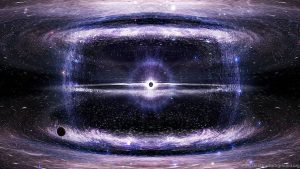- 24 April 2024
- 852
Cosmology Explored: A Voyage through Space and Time

Cosmology, the study of the universe and its origins, captivates the human imagination like few other fields of science. From the earliest civilizations gazing at the stars to modern scientists probing the depths of space with cutting-edge technology, humanity has strived to unravel the mysteries of existence. In this article, we embark on a journey through the vast expanse of cosmology, exploring its history, theories, tools, and the profound questions it raises about our place in the cosmos.
Introduction to Cosmology
What is Cosmology?
Cosmology is the branch of astronomy that deals with the origin, structure, and evolution of the universe. It seeks to understand the fundamental nature of space, time, and matter on the largest scales.
Importance of Studying Cosmology
Studying cosmology not only satisfies our innate curiosity about the universe but also provides valuable insights into the nature of reality itself. It helps us comprehend the past, present, and future of the cosmos and sheds light on our place in the grand scheme of things.
Historical Perspectives
Early Ideas about the Universe
Throughout history, various cultures have developed cosmological beliefs to explain the cosmos. From the ancient Greeks’ geocentric model to the Chinese concept of Yin and Yang, these early ideas laid the groundwork for modern cosmology.
Contributions of Ancient Civilizations
Civilizations such as the Babylonians, Egyptians, and Mayans made significant contributions to early astronomy, laying the foundation for later scientific advancements. Their observations of celestial phenomena helped shape our understanding of the cosmos.
Modern Cosmology
The Big Bang Theory
The prevailing theory of the universe’s origin, the Big Bang theory, posits that the universe began as a hot, dense singularity approximately 13.8 billion years ago. This explosive event gave rise to the expansion of space-time and the formation of all matter and energy.
Expansion of the Universe
Observations of distant galaxies moving away from us at increasing speeds provide compelling evidence for the expansion of the universe. This expansion, discovered by Edwin Hubble in the 1920s, continues to shape our understanding of cosmic evolution.
Dark Matter and Dark Energy

Despite comprising the majority of the universe’s mass-energy content, dark matter and dark energy remain elusive and mysterious. These enigmatic substances exert gravitational influence on galaxies and cosmic expansion, yet their true nature eludes detection.
Tools of Cosmology
Telescopes and Observatories
Telescopes, both ground-based and space-based, serve as the primary tools for observing the cosmos. From the iconic Hubble Space Telescope to cutting-edge observatories like the Atacama Large Millimeter/submillimeter Array (ALMA), these instruments allow astronomers to peer deep into the universe.
Satellites and Space Missions
Space missions, such as the Cosmic Microwave Background Explorer (COBE) and the Planck spacecraft, have revolutionized our understanding of the early universe. By mapping the cosmic microwave background radiation, these missions provide crucial insights into the universe’s infancy.
The Structure of the Universe
Galaxies
Galaxies, vast collections of stars, gas, and dust held together by gravity, represent the building blocks of the universe. From spiral and elliptical galaxies to irregular formations, the diversity of galactic structures offers clues to the universe’s evolution.
Stars and Planets
Stars, the celestial furnaces that illuminate the cosmos, play a central role in cosmology. Planets, orbiting these stellar bodies, offer potential habitats for life and provide valuable insights into planetary formation and evolution.
Cosmic Microwave Background Radiation
The cosmic microwave background radiation, leftover radiation from the Big Bang, serves as a treasure trove of information about the early universe. By studying its characteristics, scientists gain invaluable insights into the universe’s infancy.
Theories of the Universe

Inflation Theory
Inflation theory proposes that the universe underwent a rapid period of exponential expansion in its early moments. This theory provides an elegant solution to various cosmological puzzles, such as the horizon problem and the uniformity of the cosmic microwave background.
Multiverse Theory
The multiverse theory suggests the existence of multiple universes, each with its own set of physical laws and constants. While speculative, this theory offers a potential explanation for the fine-tuning of our universe’s parameters.
The Search for Extraterrestrial Life
Conditions for Life
The search for extraterrestrial life involves identifying planets within the habitable zone of their parent stars, where conditions may be conducive to life as we know it. Factors such as the presence of liquid water and a stable atmosphere are crucial considerations.
SETI and Other Initiatives
The Search for Extraterrestrial Intelligence (SETI) and other initiatives employ various methods, including radio telescopes and optical surveys, to detect signs of intelligent life beyond Earth. While no conclusive evidence has been found to date, the search continues unabated.
Cosmic Mysteries
Black Holes
Black holes, regions of spacetime where gravity is so intense that nothing, not even light, can escape, remain one of the most enigmatic phenomena in the universe. Studying black holes offers insights into gravity, space-time, and the nature of singularities.
Wormholes and Time Travel
Theoretical constructs such as wormholes, hypothetical tunnels through spacetime, capture the imagination with the possibility of interstellar travel and time dilation. While purely speculative, the study of wormholes pushes the boundaries of our understanding of space and time.
The Fate of the Universe
The ultimate fate of the universe remains an open question, with possibilities ranging from continued expansion to eventual contraction or heat death. Understanding the underlying mechanisms governing cosmic evolution is essential for predicting the universe’s destiny.
The Future of Cosmology
Advancements in Technology
Advancements in technology, such as next-generation telescopes and computational simulations, promise to revolutionize our understanding of the cosmos. From mapping the distribution of dark matter to detecting gravitational waves, these tools hold the key to unlocking new cosmic mysteries.
Unanswered Questions
Despite centuries of inquiry, cosmology continues to confront numerous unanswered questions. From the nature of dark matter and dark energy to the origin of the Big Bang, these mysteries serve as both challenges and opportunities for future generations of scientists.
Conclusion
In conclusion, cosmology offers a window into the origins, structure, and evolution of the universe, captivating the imagination with its profound mysteries and awe-inspiring discoveries. From the Big Bang to black holes, from the search for extraterrestrial life to the fate of the cosmos, the journey through cosmology is one of endless fascination and exploration.
FAQs
What is the significance of studying cosmology?
Studying cosmology helps us understand the fundamental nature of the universe and our place within it. It addresses existential questions about the origin, structure, and fate of the cosmos.
How do astronomers study the early universe?
Astronomers study the early universe through observations of cosmic microwave background radiation, the oldest light in the universe. They also use computer simulations and theoretical models to reconstruct cosmic evolution.
Are there practical applications of cosmology?
While cosmology primarily focuses on theoretical and observational research, it has indirect practical applications, such as technological advancements in space exploration and satellite communication.
What is the role of dark matter and dark energy in cosmology?
Dark matter and dark energy comprise the majority of the universe’s mass-energy content, yet their true nature remains elusive. They play a crucial role in shaping the large-scale structure and dynamics of the cosmos.
Will we ever find evidence of extraterrestrial life?
The search for extraterrestrial life remains ongoing, with advancements in technology increasing our chances of detection. While no conclusive evidence has been found thus far, the exploration of exoplanets and the study of extremophiles offer promising avenues for discovery.

